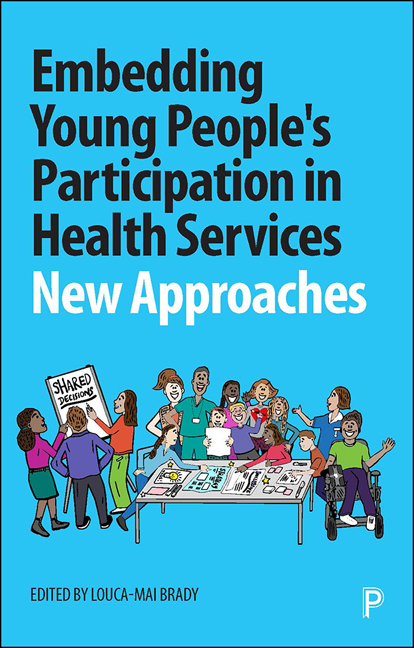Book contents
- Frontmatter
- Dedication
- Contents
- List of Boxes, Figures and Tables
- Summary
- Notes on Contributors
- Acknowledgements
- Foreword
- Introduction: Embedding Young People’s Participation in Healthcare
- PART I Young People’s Participation in Individual Decision-Making
- PART II Participation in National Projects and Programmes
- PART III Collaborative Research in NHS Services
- PART IV Young People-led Participation
- Index
Introduction: Embedding Young People’s Participation in Healthcare
Published online by Cambridge University Press: 25 February 2021
- Frontmatter
- Dedication
- Contents
- List of Boxes, Figures and Tables
- Summary
- Notes on Contributors
- Acknowledgements
- Foreword
- Introduction: Embedding Young People’s Participation in Healthcare
- PART I Young People’s Participation in Individual Decision-Making
- PART II Participation in National Projects and Programmes
- PART III Collaborative Research in NHS Services
- PART IV Young People-led Participation
- Index
Summary
‘Knowing that I could be part of preventing some of the struggles I had within services, for the next young people coming through them, was what motivated me to get involved in participation. Not only did I want to see changes, but I myself could be part of that change.’ Lizzy, young co-author, Chapter 7
The United Nations Convention on the Rights of the Child (UN, 1989: UNCRC) states that all children have a right to the highest possible standards of both healthcare and to have a say in matters that affect them. Involving young people in the commissioning, development and delivery of health services is essential to ensure that these better reflect children and young people's priorities and concerns. There are disparities in who participates, the types of decisions they are involved in making and the extent to which participation is meaningful and effective for both young people and professionals (Davey, 2010; Percy-Smith, 2010). It is also important to consider the forms participation takes and the processes which facilitate that involvement, that is, what young people are involved in and how, and the impact that this has on both services and young people.
This book responds directly to these ideas. In so doing it presents a range of different models and approaches to participation in healthcare practice from the perspectives of people working in the NHS and voluntary sector, researchers and young people. This includes considering young people's participation in shared decision-making (Part I), participation in national projects and programmes (Part II), collaborative research with young people in NHS Trusts (Part III) and young people-led participation (Part IV). These examples present new insights into the realities, challenges and opportunities for young people's participation in healthcare while also providing a critical perspective on current approaches. In the concluding chapter (Chapter 10), a new approach to understanding young people's participation is put forward to inform future thinking and practice.
Young people: a note on terminology
‘Childhood’ has many and varied definitions including ‘the status of being a minor, the early-life state of immaturity whether actual or ascribed and the process of growing towards adulthood’ (Alderson, 2013, p 4).
- Type
- Chapter
- Information
- Embedding Young People's Participation in Health ServicesNew Approaches, pp. 1 - 28Publisher: Bristol University PressPrint publication year: 2020



